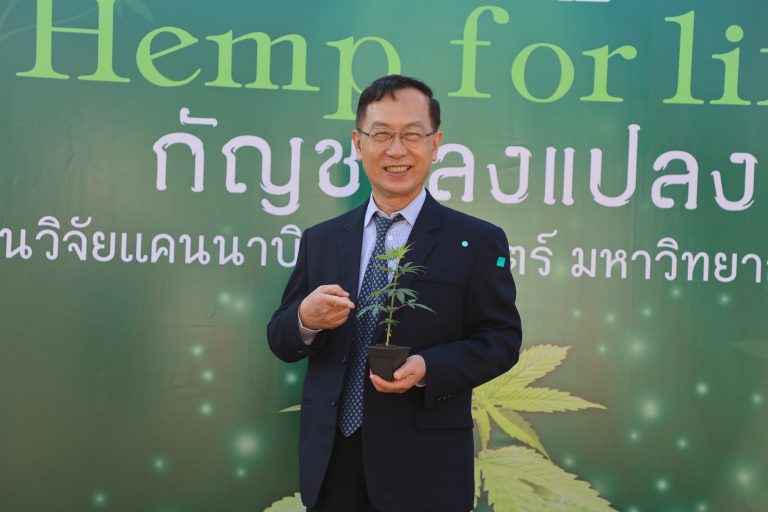
January 12, 2021 at 16:00 p.m., – Assoc. Prof. Charnchai Panthongviriyakul, M.D., President of Khon Kaen University presided over the “planting hemps” ceremony at the Vegetation Unit, Horticulture Department, Faculty of Agriculture, Khon Kaen University. The ceremony was organized by the Cannabis Research Institute, with Prof. Dr. Monchai Duangchinda, Vice President for Research and Graduate Studies giving a report of the background. Prof. Dr. Phewphan Maleewong, Assistant to the President for Research and Graduate Studies; Assoc. Prof. Dr. Darunee Chotisayangkoon, Dean of the Faculty of Agriculture; Asst. Prof. Dr. Chanon Lapjit, Head of the Cannabis Research Project for Medicine and Industry of the Cannabis Resaerch Institute welcomed the group of KKU administrators, deans, the 4th Regional Director of the Narcotics Prevention and Suppression Office ; Khon Kaen Public Health Chief Officer; researchers, staff, the press, and a lot of guests joined the ceremony.

Pro. Dr.Monchai Duangchinda said, “This hemp planting ceremony is organized by the Cannabis Research Institute, the Research and Graduate Study Section and the Research Administration Division. The Institute’s major mission is the carry out research on cannabis and hemps for medicinal and industrial uses. The research carried out covers all relevant fields, including the Faculty of Agriculture that researches on planting, improving and developing cultivars; the Faculty of Sciences studies how to extract cannabis and hemp oils and analyze important elements; Faculty of Pharmaceutical Sciences researches and develops types and specifications of drugs to submit to the Faculty of Medicine to conduct clinical research on patients of specific diseases. These will lead to special types of medicine to treat certain diseases or personalized medicine. Lastly, the Faculty of Veterinary Medicine researches on the residues to develop into animal feeds.”
……………“Now, KKU has received the authorization to produce hemps (Document No. 19/2563), which was authorized in October, 2020. KKU can now plant and harvest or manufacture hemps. The research plantation covers an area of 1,664 square meters. The 3 cultivars planted were obtained from the High Area Research and Development Institute (Public Organization): RPF1, RPF3 (2 kilograms each), and 50 seeds of RPF 4. The hemps planted today are part of the research and evaluation for development of drugs for medicine and related industry. This is the first place in Khon Kaen that has been authorized to grow hemps. Over 700 young plants were planted in December, 2020 and they are now ready to be planted at the plantation. From now, we will wait for 120-150 days before they will bloom and the flowers can be cut for the research.”

Assoc. Prof. Charnchai Panthongviriyakul, M.D., said at the opening ceremony, “The Cannabis Research Institute conducts research and development of cannabis and hemps for medicine and industrial benefits, which will be on man and animals. At present, the institute is carrying out research, evaluation and development of hemps for medicine and industry in order to analyze the important elements in the form of drugs.”
……………“Khon Kaen University has been authorized to grow cannabis, as mentioned above, and so the planting today is the first time in Khon Kaen. It is believed that the research will be useful for medicine and various industries that already promote hemps. The results of the research can be transferred to community enterprises, different organizations of the government and the private sector so that hemp and cannabis products can be further and legally developed.”
Hemp in Thailand is categorized as a narcotic drug Type 5, similar to cannabis according to the Narcotics Act of 1979. This group of plants contain Tetrahydrocannabinol (THC), which is a stimulant of nerves, Cannabinol (CBN) and Cannabidiol (CBD). Hemps contain much lower THC than cannabis. Hemps also contain CBD in the seeds. At present, scientific research has changed the belief towards hemp from negative to positive. Hemps are actually a cash crop that is outstanding for the fiber, giving a higher yield that cotton and is of higher quality. Labor use in cropping is lower, and there is not much need of pesticides. Hemps grow well and receive interest in the use of fiber that replaces synthetic materials. In the future, hemps may be of a value as high as hundreds of thousands of millions from manufacturing all parts of hemps into various kinds of products and goods such as textiles, clothes, foods, animal feeds, cosmetics, paper, vehicle parts, construction materials and biomass energy in various forms. This means cropping will have to be promoted at a vast scale. In Thailand, the weather is rather warm and the amount of THC may be relatively high. Now, hemps can be grown in 6 provinces and 15 districts in the North of Thailand. In order to obtain fiber for industry, the plantation has to follow the ministerial law that requires Tetrahydrocannabinol (THC) lower than 1.0% per dry weight. Growing hemps necessitates a narrow length between trees, in order to make the tree grow straight up to over 2 meters high for the appropriate use of fiber from trunk. The seeds and leaves can also be used for certain purposes.
Khon Kaen University is a research university that conducts research in health sciences, sciences and technology, humanities and social sciences. Research carried out covers both basic research and applied and clinical research. There are potential researchers and research tools that enable research in all fields. The Cannabis Research Institute has therefore been established to do research on cannabis and hemps and to analyze the THC and CBD. Besides the benefits in medicine, the knowledge of hemps and cannabis will be of use, with the Institute acting as the center of information to transfer the news and information to community enterprises, communities, public and private organizations, and the results can be extended at the industrial level.
News / photos: Wachara Noichompoo

















